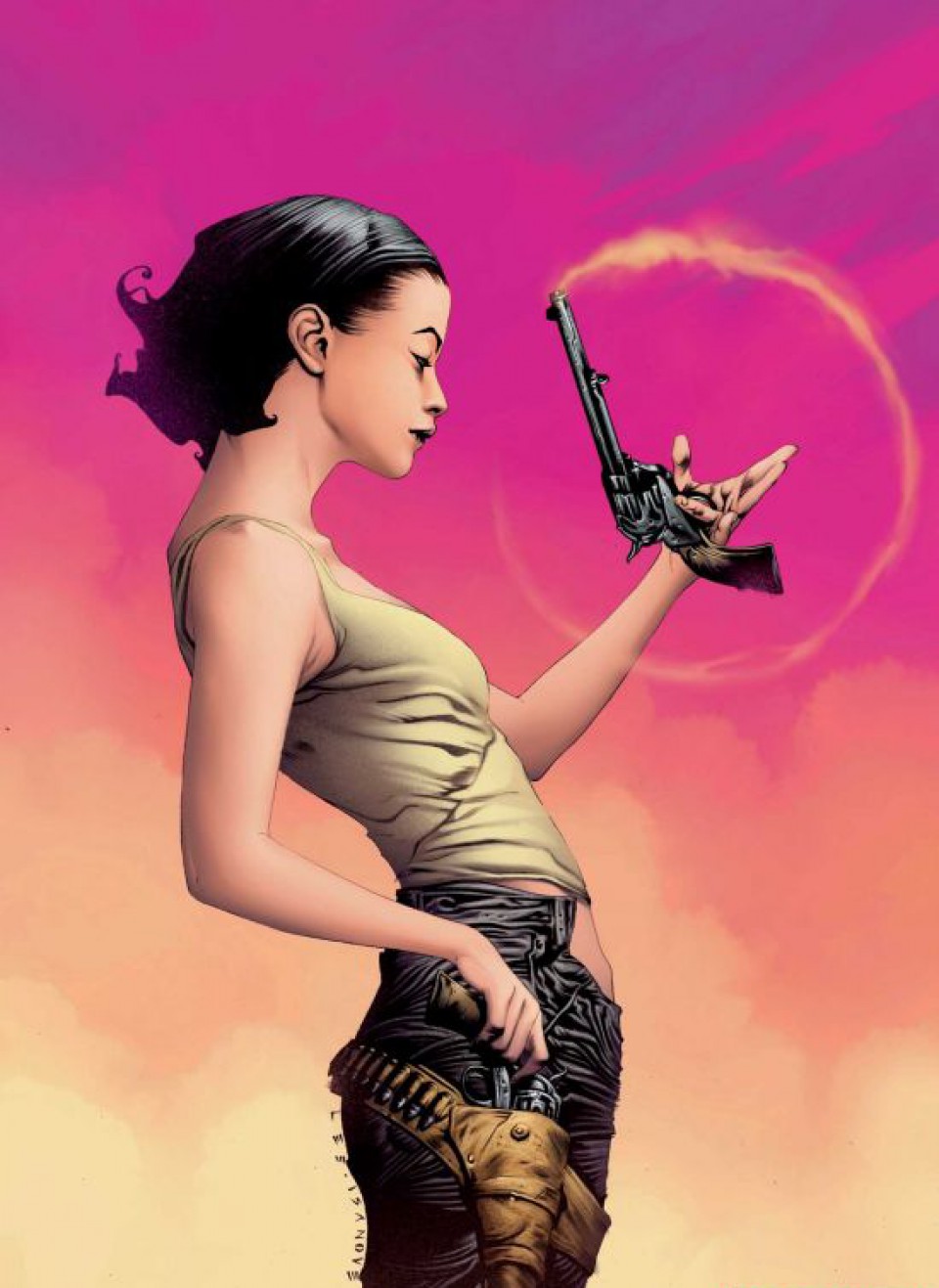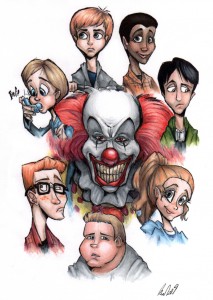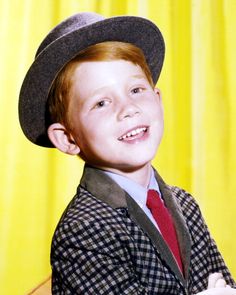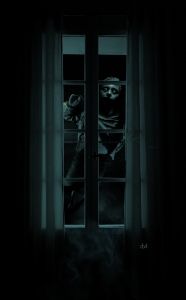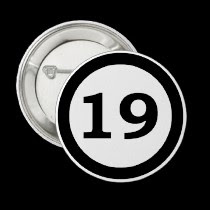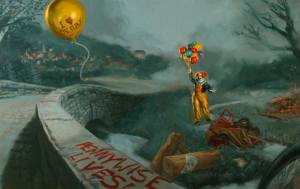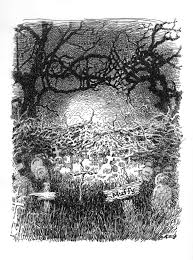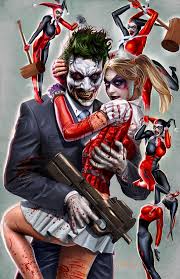As a child, I was a victim of bullying. I was tormented pretty often. I must say, I think there are some kids that are just born bad…
But luckily, I was able to escape my small town and the bullying, and I have become the happy, health well-adjusted adult who spends way too much time blogging about Stephen King.
Although that is probably why I was lucky…I am not a character in a Stephen King novel, so I was able to escape my tormentors!
King has written extensively about childhood and bullying. Works such as It, Sometimes They Come Back, Low Men in Yellow Coats and Dreamcatcher all deal with characters who are bullies, and characters who must fight off the bullies, as their survival literally depends on it.
Well, King has added another story to his canon on childhood and bullies: Bad Little Kid, which is one of the stories in King’s latest collection, The Bazaar of Bad Dreams. And this story is proof, that yes, childhood is hell, and that some people literally do not ever escape their demons.
Synopsis
Bad Little Kid begins with a man named Leonard Bradley, who is visiting someone who is in prison. That person is a man named George Hallas, who has been jailed for some unnamed crime and will soon be executed for the unnamed crime. Bradley is actually Hallas’ attorney, and is fighting so that Hallas’ life may be spared. We then learn that Hallas is on death row for killing a child, but that Bradley has some major questions as to why this crime was committed. Hallas then proceeds to tell Bradley the events that led him to commit the most awful crime of all: the murder of a child.
Hallas grew up without a mother, who died shortly after his birth. Hallas was raised by his father and housekeeper, Nona McCarthy. The family moved several times during his childhood. One of the towns that the family lived in was Talbot, Alabama, where Hallas befriends a mentally handicapped young girl named Marlee Jacobs.
Marlee and Hallas would walk to school together every day. One day, Marlee was upset because she could not find her lunchbox. Hallas comforts her, and Marlee temporarily forgets about her lunchbox.
However, when the children are walking home from school, they hear someone tormenting them. Hallas sees a young boy who is short and chubby with red hair, and who also wears a beanie on his head with a plastic propeller. Hallas does not recognize him from either his neighborhood or his school. The boy torments Hallas and Marlee, who try to ignore him and head home. However, the little boy has Marlee’s lunchbox, and continues to torment her.
The little boy throws the lunchbox out into the street, and tells Hallas that it is his fault. Marlee runs out into the street and is hit by a car driven by one of the teachers who works for the school that she attends with Hallas. The accident proves fatal for Marlee, who dies almost immediately.
Bradley listens to the story, but is skeptical that there even was a little kid, and thinks that Hallas may have imagined his tormentor. Hallas says that he spent the next several years dreaming about that kid, but passes it off as a childhood tragedy.
Hallas attends college, where he majors in drama. He finds some success, and also begins dating a young woman named Vicky. Vicky is high-strung and ambitious, and also has a tendency to abuse prescription drugs.
Vicky and Hallas both try out for roles in a production of The Music Man. Hallas gets a lead role, but Vicky becomes nervous and her audition is a disaster. Hallas tries to comfort Vicky, and they walk down the sidewalk. Hallas then hears someone tormenting him, and it is the same little kid he saw as a child. The little kid has not aged a day. Hallas starts to chase him, but Vicky stops him and tells him that the boy is not worth it.
Hallas then drops Vicky off at her apartment. This is the last time he sees Vicky alive, as Vicky commits suicide by hanging herself. Hallas finds out from Vicky’s distraught roommate Carla that Vicky believed that he put the little kid up to tormenting her. Hallas assures Carla that the little kid was indeed real, and that Carla is not at fault for Vicky’s suicide.
Carla and Hallas later marry, and Hallas turns to accounting for a career, rather than the theater. We also learn the little continues to torment Hallas’ loved ones, including his former housekeeper, Nonie. Hallas’ father had died in a mining accident, and the little boy tries to convince Nonie that the boots she had given Hallas’ father were responsible for the accident. Nonie also passes away from a heart attack, and Hallas believes the little boy to be responsible, After Nonie’s funeral, Hallas receives a package in the mail that contains the little boy’s hat. He then burns the hat, believing it to be cursed.
Carla becomes pregnant, and she and Hallas begin attending church on Sundays again. One Sunday, Hallas sees his tormentor on the church steps. A firecracker is thrown in Carla’s direction, and she falls down the steps, suffering a miscarriage and losing the baby.
Hallas’ marriage suffers after the loss of their child, and he throws himself into volunteering at his church. He pays special attention to young boys who need a mentor. He is able to raise funds for a boy named Ronnie to have the surgery needed to correct his vision. Hallas then uses Ronnie as bait to trap the little boy who has been tormenting him.
He is successful in trapping the little boy, and chases him out into the street. Hallas then shoots the little in the back, as revenge for the all deaths he has caused. He almost believes that he has killed an ordinary child, but sees a dark presence in the little boy’s eyes before he passes away. Hallas is arrested immediately, and found guilty of murdering. He also receives the death penalty.
Bradley lets Hallas finish his story, but he is still skeptical. He asks Hallas why the creature picked him, but Hallas cannot answer that question. Hallas also points out that no one has been able to identify the little boy, and no family members ever claimed the body. Bradley promises Hallas that he will attend his execution.
Six days later, Hallas is executed. Bradley is attendance, along with Hallas’ priest. Before his death, Hallas warns Bradley that evil will disguise itself as a child.
Bradley leaves the prison after Hallas is executed. He sees movement from the corner of his eye. He also notices that his car has been vandalized. Bradley opens his car door, and finds a beanie with a propeller on top of it. There is a note stating: Keep it, I have another one. The note also states that Bradley is next. In the distance, Bradley hears a child’s laughter.
My Thoughts
So. Wow.
Uncle Stevie is known for his creepy stories, and Bad Little Kid did not disappoint in that department. Uncle Stevie is also good at taking what should be innocent, and corrupting it. Again, this story did not disappoint in that department, either.
Take the title character for instance…
First, my mind went here:
Yeah, if Opie Taylor went bad, and somehow all the lessons from his dad didn’t stick…
Maybe this creature is some evil Twinner to Opie Taylor, then…
But of course, my mind went here too:
Ah, yes. Danny Bonaduce. And I don’t think this is a case of an evil Twinner. Mr. Bonaduce is capable of being bad all on his own, thank you! Now I will never look at a partridge in a pear tree the same way again!
So yes, this was one seriously creepy story. Some people literally can never escape their demons. Hallas is one of those people. His demon followed him everywhere and he was only able to get away from it by dying. The demon takes away everything that matters to Hallas: his childhood friend. his first love, his family, his marriage and eventually his life. The only way that Hallas was able to escape the creature that was tormenting him was through death. And no reason was ever give why Hallas was chosen, he just was. Often, the lottery of life will throw you some bad stuff, and there is nothing you can do but take what is dealt to you, and hope that you can somehow survive it.
And the ending to this one…oh boy..
King has some endings that are bleak (Revival and Pet Sematary immediately come to mind), and Bad Little Kid was no different.
Nobody really won at the end of the story. Hallas died at the hands of the state. Most of Hallas’ family and friends were dead. And then there was Bradley.
I would say the Bradley was the biggest loser at the end. Not only did his client die, Bradley inherited the sin of client. Of course, evil does not die. It will continue to live on, even if in a different form. So now Bradley is condemned to live with the evil, and the question is not will the evil win, but when it will win. For it will win, as the scales are tipped in its favor for eternity.
